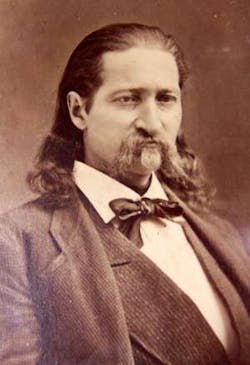A few weeks back I was playing some cards and ended up with two pair: Aces and Eights. I was immediately asked by the player opposite me what the significance of these cards meant.
"I assume you are referring to the hand Wild Bill Hickok was holding when he was shot in the back?" I threw back at him.
He smiled broadly and said, "Yes! The dead man's hand."
This got me thinking if this was the origin of the so-called Dead Man's Hand. Off I went to do some research and realized I hadn't mention James Butler Hickok. So much has been written about Wild Bill that the facts sometimes blend with the fiction. I have done my best to shovel through the stories to present only those that have been reported by multiple references.
James Butler Hickok was born in Homer, Illinois (what we now call Troy Grove, LaSalle County) on May 27, 1837 to William Alonzo Hickok and Polly Butler (although there are also accounts that their names were Abner and Eunice). The family farm was a stop on the Underground Railroad and James showed an affinity for shooting at an early age, perhaps picking up the skill to protect the family from the slave trackers. James perfected his marksmanship at the cost of local squirrels and raccoons. He was by some accounts being raised with the hopes that he become a Baptist Minister. Alas, this was not to the case.
Around 1855 (or 56), James and his brother Lorenzo left home and would finally settle in Monticello, Kansas Territory. James quickly secured a job driving a stage coach on the Santa Fe and Oregon trails, putting his shooting skills to work protecting the state patrons. This is about the time the "Wild Bill" moniker surfaces. There are far too many theories as the origin of the name so I will not add any of my own conjecture here. Let us just assume the James didn't have a problem with the nickname and never sought to correct it. There is one tale about Wild Bill having a one on one with a grizzly bear during one of the coach runs near Rock Creek Station, Nebraska. Apparently the bear almost killed him before Bill relieved him of his life. Probably not true, but it goes to show that Bill was never found to correct any of the inaccuracies in these accounts.
During the Civil War, Bill was employed as a scout in the Union Army. For a brief time he even served under Custer in the 7th Cavalry. Because of his stature and long locks he was reportedly mistaken for Custer on several occasions. Probably the best description of Wild Bill was written by General George Armstrong Custer (at the time a Lieutenant Colonel):
"Wild Bill was a strange character, just the one which a novelist might gloat over. He was a plainsman in every sense of the word, yet unlike any other of his class. In person he was about six feet one in height, straight as the straightest of the warriors whose implacable foe he was; broad shoulders, well-formed chest and limbs, and a face strikingly handsome; a sharp, clear, blue eye, which stared you straight in the face when in conversation; a finely shaped nose, inclined to be aquiline; a well-turned mouth, with lips only partially concealed by the handsome moustache. His hair and complexion were those of the perfect blonde. The former was worn in uncut ringlets falling carelessly over his powerfully formed shoulders. Add to this figure a costume blending the immaculate neatness of the dandy with the extravagant taste and style of the frontiersman, and you will have Wild Bill, then as now the most famous scout on the plains. Whether on foot or on horseback, he was one of the most perfect types of physical manhood I ever saw."
The beginning of Hickok's reputation as a gunfighter began (reportedly) when David McCanles called out Bill from the Station House in Rock Creek. Wild Bill emerged onto the street and immediately drew one of his two .36 caliber SA Navy revolvers. According eye witness accounts he shot McCanles in the chest from 75 yards, killing him instantly. There were reports that the deadly shot came from another shooter much closer to McCanles (a theory supported by Hickok thereby relieving him of charges).
Others claim that Hickok won notoriety when he and David (or Davis) Tutt had it out in the middle of the public square in Springfield on July 21st, 1865. Apparently they had a disagreement over a card game and concluded that guns were the only way to settle their differences. At 50 yards, both men drew their pistols, Dave was quicker but missed his mark. Bill struck Tutt in the heart and was charge but later acquitted after pleading self defense. This was the first recorded instance of two men dueling in quick-draw fashion (that I've ever found), rather than walking paces with guns already drawn.
By 1866 Bill was making a living as a gambler and had come to the attention of a writer, George Ward Nichols. The subsequent article appeared in the February, 1867 edition of Harper's New Monthly Magazine. Many newspapers of the time claimed gross inaccuracies in the article. Notably when asked how many men he had killed Bill replied, "I suppose I have killed considerably over a hundred." 1867 saw Bill become sheriff of Hays City, Kansas. The city had a reputation as lawless and wild and of course Bill set out to clean it up. He shot Bill Mulvey in a gunfight in August 1869 and the following month killed Samuel Strawhun. The townsfolk began to fear Hickok and replaced him with Deputy Peter Lanihan.
1871 saw Bill as the Marshal of Abilene, Kansas. By this time Hickok spent most of his time playing poker and shooting stray dogs (he received 50 cents per). Following an incident in October when he shot and killed two men, Officer Mike Williams and Phil Coe, the city council voted to remove him from office. Many claimed Bill was too fast to the gun, but remember Hickok claimed, "No, by heaven I never killed one man without good cause." He did regret the shooting of Deputy Williams, as Williams was running toward him apparently to assist.
There is so much written about Wild Bill Hickok that I cannot do justice in this space. The notable instances in his life are too numerous to mention here (some of which are probably true). One thing we have as definitive fact is the manner in which he died. Hickok was shot on August 2nd, 1876 in the back of the head while playing poker. It seems that Bill had not heeded his own rule of never sitting with your back to the door. It would be his fatal mistake. The hand he was playing showed a pair of Aces and Eights. The final card remains a mystery.
According to the Black Hills Pioneer (Deadwood Dakota's only newspaper) on August 5th, 1876:
"On Wednesday about 3 o'clock the report stated that J.B. Hickok (Wild Bill) was killed. On repairing to the hall of Nuttall and Mann, it was ascertained that the report was too true. We found the remains of Wild Bill lying on the floor. The murderer, Jack Mc Call, was captured after a lively chase by many of the citizens, and taken to a building at the lower end of the city, and a guard placed over him. As soon as this was accomplished, a coroner's jury was summoned, with C.H. Sheldon as foreman, who after hearing all the evidence, which was the effect that, while Wild Bill and others were at a table playing cards, Jack Mc Call walked in and around directly back of his victim, and when within three feet of him raised his revolver, and exclaiming, "damn you, take that," fired; the ball entering at the back of the head, and coming out at the centre of the right check causing instant death, reached a verdict in accordance with the above facts."
About the Author
Charles Bennett
Charles Bennett was born in our Nation's Capital and grew up in the Maryland suburbs. Mr. Bennett has been working in all aspects of the publishing industry since the late 1980s primarily in the fields of commercial photography and magazine production. Moving to California in 1992 to attend college resulted in B.F.A and Masters degrees. California also supplied Mr. Bennett with his wife. The two of them are avid sports persons and participate in shooting, scuba diving, surfing, running and bicycling. As a long time hobby Mr. Bennett has studied the legends of American law enforcement which led to his writing these columns.

